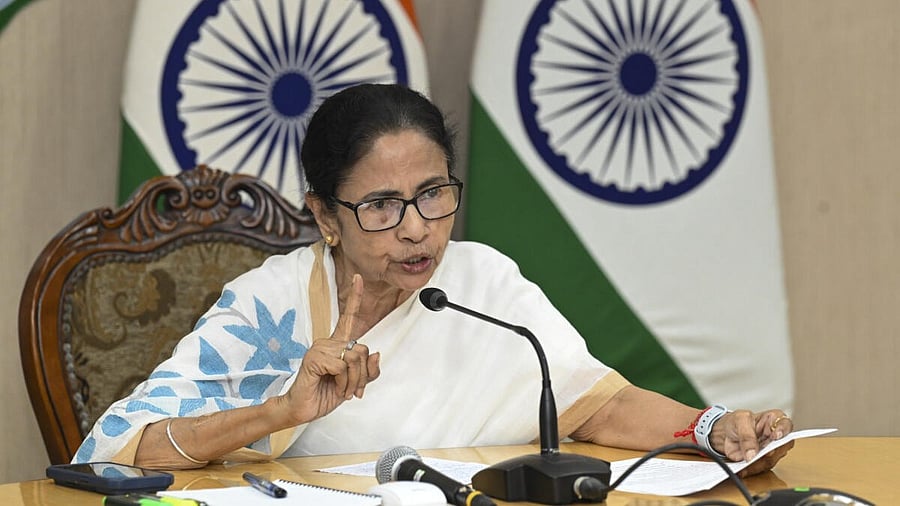
West Bengal Chief Minister Mamata Banerjee
Credit: PTI Photo
Kolkata: In a push to reclaim the Matua vote and blunt TMC supremo Mamata Banerjee's "Bangali Asmita" pitch, the BJP has launched CAA help desks in parts of West Bengal, facilitating "citizenship applications without documents" in what is being seen as its most aggressive outreach initiative to woo refugee voters ahead of the 2026 assembly polls.
Branded as "CAA Sahajogita Shibirs", these help desks first emerged in Bagda and are now spreading rapidly to Bongaon South and other Matua-majority pockets in North 24 Parganas.
Their pitch is clear: "apply first, verify later". Refugees, who fled neighbouring countries due to religious persecution, mostly undocumented, can still apply for Indian citizenship under the Citizenship (Amendment) Act, a BJP leader said.
The BJP is setting up these camps as both a lifeline for persecuted Hindus from Bangladesh and a direct ideological counter to Mamata Banerjee's identity politics, the party functionary said.
"CAA is a law passed under the BJP's rule to help persecuted minorities, especially Hindus from neighbouring countries. Its smooth implementation is our responsibility. There have been issues related to documentation. It will be taken care of. BJP workers will stand by the refugee society everywhere," said West Bengal BJP president Samik Bhattacharya.
Local BJP workers and Matua volunteers are assisting with online forms, securing affidavits, and handing out receipts that act as proof of application. The party's message is "justice delayed is no longer denied". Behind the visible mobilisation lies political urgency and a series of unsettling episodes that have injected fresh momentum into the CAA campaign.
Just last month, a Matua family from West Bengal, now residing in Maharashtra, was detained by Pune police on suspicion of being Bangladeshi, despite possessing identity documents and even an ID card from the All India Matua Mahasangha signed by Union Minister Santanu Thakur.
With the CAA rules notified in 2024, allowing persecuted non-Muslim migrants from Pakistan, Bangladesh, and Afghanistan, who entered India before December 31, 2014, to apply for citizenship, the BJP is now in overdrive, attempting to both rebuild trust and correct course after initial confusion.
Many applicants had earlier tried to apply online but dropped out midway after realising they lacked valid documentation. The Mahasangha is playing a leading role in the campaign.
"These camps will be held across West Bengal, not just in refugee belts. It's not just about Matuas, every persecuted Hindu has a stake in this. Over the next few months, we aim to reach 1.5 crore people," said Mahitosh Baidya, general secretary of the Mahasangha.
In Bagda, saffron-clad volunteers help elderly applicants fill forms under BJP tents. Mobile booths move from village to village. "As per CAA's 10-D clause, no persecuted non-Muslim refugee who entered India before 31 December 2014 can be expelled for lack of documents. That is our guarantee," said a BJP leader managing the camps, citing gazette notifications.
"The 'apply first, verify later' model is central to the campaign. Once an online application is submitted and acknowledged, document verification will take place later during district-level hearings. Immediate paperwork is not required, an assurance designed to address long-standing fears. "It is this anxiety we are tackling," said a BJP leader from Gaighata.
"People are scared to even apply. We're saying: take the first step, we will walk with you," he said.
The Mahasangha, led by Union Minister Santanu Thakur, has emerged as a full partner in the effort. At a student-youth conference in Thakurnagar, the Matua spiritual nerve centre, he announced volunteer training programmes to assist with filing applications, issuing affidavits, and verifying religious identity.
Thakur alleged, "The Bengal government is deleting Matua names from electoral rolls in places like Bagda and Gaighata. And now, they are crying about Bengali pride? Matuas were promised the CAA. The Centre has delivered. The state must cooperate." With camps planned in Harindanga, north Bengal's tea garden regions, and several parts of Nadia, the BJP's strategy is clear - build early momentum, flood the system with applications, and revive grassroots networks ahead of the 2026 polls, a party leader said.
But the TMC is not ceding ground. Mamata Banerjee has mounted a counter-offensive move by combining emotional appeals with allegations of harassment of Bengali-speaking migrants in BJP-ruled states.
TMC MP Mamata Bala Thakur said, "Matuas in Maharashtra were branded as Bangladeshis. Even the minister's signature couldn't protect them. That exposes the BJP's duplicity. If the CAA is so empowering, why are Bengali Hindus still being questioned outside Bengal? This is a gimmick." The TMC is weaving such incidents into a broader narrative of exclusion and fear.
Political observers say the stakes are high. Political scientist Biswanath Chakraborty observed, "The BJP's strategy carries both promise and risk. If the 'no-document' pitch backfires and leads to mass rejections during hearings, it may reinforce the TMC's narrative that CAA was just a political stunt. But even a few successful applications can signal that CAA is a real safety net." Ultimately, the battle in Bengal's refugee heartland is shaping into a contest of credibility between the TMC's emotive appeal and the BJP's promise of deliverance.